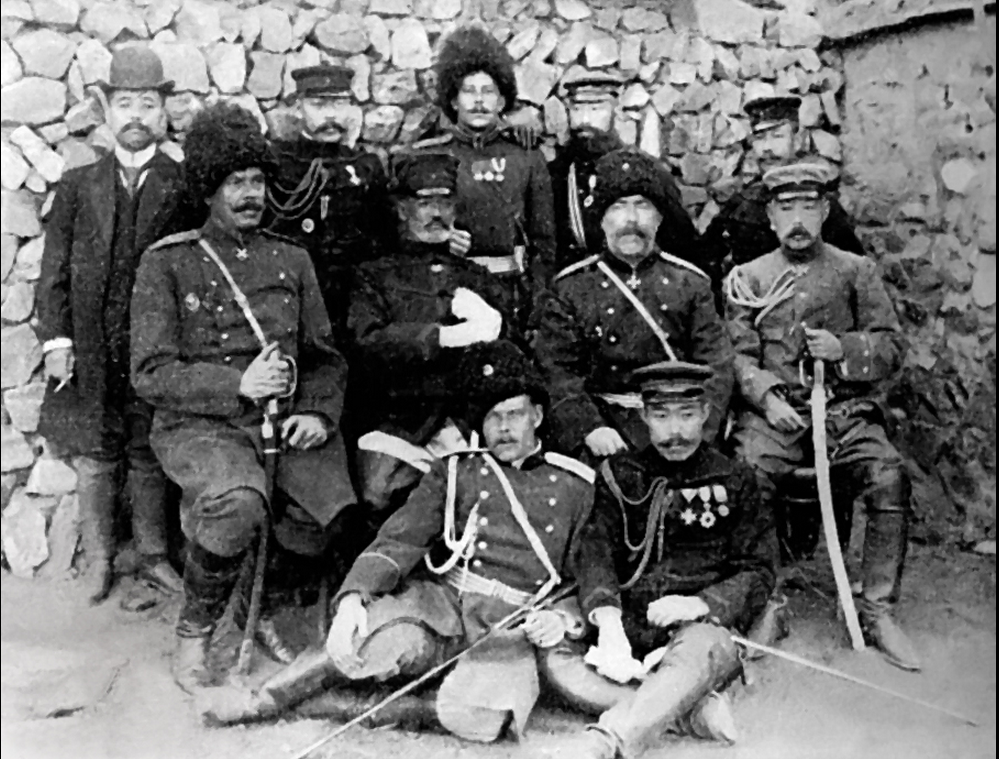 |
| After fierce battle ended, General Nogi as a winner and General Stessel as a loser sit next to each other as friends together with their courageous men |
The Meiji Emperor deeply desired that Baron Anatoly M. Stessel, General of the Russian Imperial Army would appear at the conference with his sword, highly honoring and
respecting the enemy general as “a great warrior” even though the Russian
Imperial Army lost the battle. General Nogi also desired that General Stessel
and General Nogi would sit next to each other as “friends” as seen in the photo above. Receiving the report that General Stessel had been sentenced to death by
the firing squad at the Russian Court-martial, General Nogi wrote a petition
letter to the Russian Emperor, describing his great
courage in serving his country in the
battlefield. The Russian Emperor then reduced “death sentence” to “exile in Siberia”. This is a good example of Japan’s traditional
Samurai Spirit which American General Douglas MacArthur never learned in his military career.
 |
| General Nogi |
 |
| General Stessel |
 |
| General Nogi standing in the center facing a captured Russian gun crew outside Port Arthur on Jan. 2, 1905 |
Japan
in
East Asia:
Unpromising
and
Discouraging Future in 19th Century
Japan's modern history and colonization
of Asia by the West are inseparably related to each other. There are three
major points we should consider as prerequisites for describing a history of
modernizing Japan.
1. At the starting point of Japan's
modernization, Japan was faced with growing military threats from Great
Britain, Russia, France, Netherlands, U.S.A., Germany, etc. while nothing but their battles for domination in Asia prevented them from
fully and easily colonizing Asia. Therefore, they were still fighting for
supremacy in Asia while Japan was going through a process of modernizing
herself, so as to maintain her own independence. ex. Great Britain completed
her control over India just 10 years before Meiji Restoration in 1868, Burma in
1886, and Malay peninsula in 1909. France took Vietnam by force in 1887.
Netherlands officially colonized Indonesia in 1904. U.S.A. annexed Hawaii in
1898, and seized Philippine the same year. Russia was posing a great threat to
Japan in those years.
2. As shown in the above, Japan was completely surrounded by the Western militaristic nations who
had strong belief in colonialism for their own benefits. Even China was struggling with
difficulties to preserve her own lands since China was in a deteriorating state
resulting from its excessive bureaucracy. Korea was just a vassal state of
China. Japan vehemently desired that Korea would soon become
independent from China and would quickly modernize herself, thereby
strengthening Japan's defense against the Western aggression. Either the Western powers or Russia
would have colonized the Korean peninsula if nothing was done. The only option
left for Japan was to help Korea become independent from China. Japan had much
stronger awareness of risks since Japan had experienced long-lasted
Samurai period.
3. China and Korea were powerless and
helpless. However, they had harbored ungrounded superiority complex over
Japan. Ex. Sino-centrism They tended to regard Japan's modernizng efforts as a disturbing factor to Sino-centrism.
Without keeping three points
in one's mind, one must not see a history of Japan in relation to what
China fabricates and what both Koreas fabricate.
White Peril: Causes of Japan-Russia
War in 1904 Viewed from the West in
1905
西洋の視点:日本が日露戦争を戦った本当の理由
"The
White Peril in the Far East" by Sidney L. Gulick
in 1905 says as follows: The direct cause of the war, then, has been Russia's
ambition for Oriental Empire, bearing down in its progress. Manchuria, Korea,
and ultimately Japan herself. This process of Russian
expansion has been steadfastly pushed, and
ruthlessly. It has brought such overwhelming destruction to innocent
people in Siberia and Manchuria; it has heaped such insult and
such humiliation upon Japan herself and it is so powerful in crushing the
national life of the conquered people, that the determination of Japan to save herself from their fate has thrilled the world into
sympathy. Two minor causes contributing to the war have been Japan's wholly altruistic motive of good-will to Korea and to China and
her desire to stand for honest straightforward diplomacy.
私の蔵書の中にThe
White Peril in the Far East 東洋白禍 1905年に出版された本であり、日露戦争の意義を説明している。ニューヨーク、シカゴ、トロント、ロンドンで出版された本だ。
その中に、上記の文書があるので翻訳(仮訳)する。
日露戦争の直接の原因は、ロシアがその発展の過程において、先ず、満州、朝鮮、そして最終的には日本を粉砕して東洋帝国の建設を目指すとする野望である。
このロシアの拡張プロセスは、着実に容赦なく進められて来ている。シベリア、満州の無辜の民に対して圧倒的な破壊をもたらしている。即ち、耐え難いほどの侮辱や屈辱を日本に与えると共に被征服者の国民生活を崩壊させていることからして、日本が、彼等と同様の運命を避けるため必死に自分達自身を救わんとする決意は、世界を戦慄と同情に駆り立てている。
この他に二つの日露戦争勃発の原因がある。それらは、日本の朝鮮及び中国に対する親善的動機であり、又、完全なる他利的な動機である。もう一つは、日本が正直で真直な外交を貫きたいとする願望である。




No comments:
Post a Comment